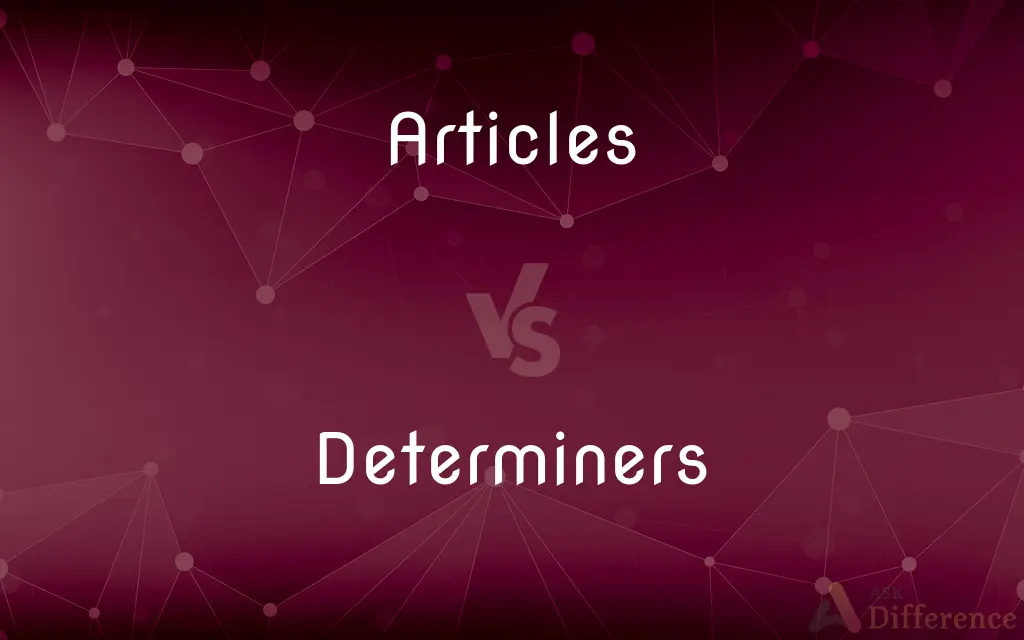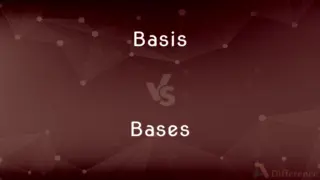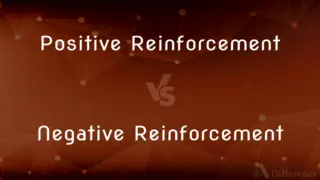Articles vs. Determiners — What's the Difference?
By Tayyaba Rehman — Published on October 7, 2023
Articles are a subset of determiners used to define the specificity of nouns; determiners modify nouns to clarify quantity, possession, or specificity.

Difference Between Articles and Determiners
Table of Contents
ADVERTISEMENT
Key Differences
Articles and Determiners are foundational elements of English grammar, with articles being a subset of determiners. Articles, including "the," "a," and "an," are used to indicate definiteness or indefiniteness of a noun, essentially specifying whether we are referring to something known to the listener or something more general. Determiners, on the other hand, serve a broader role in grammar, including not only articles but also possessives like "my" and "your," demonstratives like "this" and "that," and quantifiers like "some" and "many," clarifying nouns in terms of quantity, possession, specificity, or definiteness.
Articles are inherent components of determiners and are typically the first words learned in English grammar. They play a pivotal role in sentence construction, providing context to nouns and shaping the meaning of sentences. Determiners encompass a wider range of words, including articles, that serve to modify nouns, providing additional information about their quantity, possession, or specificity, and thus offer more varied and complex means to convey meaning in sentences.
Articles are precise in function, primarily focusing on specifying whether a noun is definite or indefinite. They are crucial for coherent expression, enabling clearer and more accurate communication. Determiners have a more extensive range and diverse functionality, addressing various aspects of nouns such as quantity, possession, and specificity, making them indispensable for constructing meaningful and nuanced expressions.
While articles are the backbone of determiners, focusing primarily on the specificity of nouns, determiners, being more encompassing, provide a richer, more versatile means to modify nouns. Both are integral to constructing grammatically correct, coherent, and nuanced sentences in English, allowing for expressive and precise communication.
Comparison Chart
Scope
Subset of determiners, narrower scope.
Broader scope, includes various types of modifiers.
ADVERTISEMENT
Function
Specify the definiteness or indefiniteness of a noun.
Modify nouns to clarify quantity, possession, etc.
Examples
“the”, “a”, “an”
“my”, “this”, “some”, “the”, “a”
Specificity
Primarily focus on the specificity of nouns.
Modify nouns in varied ways to provide specificity.
Usage
Used to introduce nouns and denote their specificity.
Used to provide additional information about nouns.
Compare with Definitions
Articles
Articles are integral components of English grammar used to introduce and specify nouns.
Using articles correctly can make sentences more understandable.
Determiners
Determiners modify nouns to provide more information about them.
My car is blue, where my is a determiner showing possession.
Articles
Articles provide context to nouns, determining their specificity.
The sun is shining, where the is the article specifying the sun.
Determiners
Determiners are words placed in front of a noun to specify number, ownership, or definiteness.
Some people prefer tea, where some is a determiner specifying an indefinite number of people.
Articles
Articles are limited to “the,” “a,” and “an” in English grammar.
An apple a day keeps the doctor away, where an and a are articles.
Determiners
Determiners include articles, demonstratives, possessives, and quantifiers.
Those shoes are nice, where those is a determiner specifying which shoes.
Articles
An individual thing or element of a class; a particular object or item
An article of clothing.
Articles of food.
Determiners
Determiners are used to clarify nouns in terms of quantity, possession, or specificity.
Every child needs love, where every is a determiner specifying all children in a group.
Articles
A particular section or item of a series in a written document, as in a contract, constitution, or treaty.
Determiners
Determiners precede nouns and provide context to them.
Many students passed the exam, where many is a determiner specifying a large number of students.
Articles
A nonfictional literary composition that forms an independent part of a publication, as of a newspaper or magazine.
Determiners
One that determines.
Articles
The part of speech used to indicate nouns and to specify their application.
Determiners
(Grammar) A word belonging to a group of noun modifiers, which includes articles, demonstratives, possessive adjectives, and words such as any, both, or whose, and, in English, occupying the first position in a noun phrase or following another determiner.
Articles
Any of the words belonging to this part of speech. In English, the indefinite articles are a and an and the definite article is the.
Determiners
Plural of determiner
Articles
A particular part or subject; a specific matter or point.
Articles
To bind by articles set forth in a contract, such as one of apprenticeship.
Articles
Plural of article
Articles
(slang) Breeches; coat and waistcoat.
Articles
(legal) the period during which a person works as an articled clerk; articling
Articles
Articles are specific determiners that denote the definiteness or indefiniteness of a noun.
The and a are articles used to introduce nouns.
Articles
Articles are words that define a noun as specific or unspecific.
A book on the table is mine, where a is the article specifying any book.
Common Curiosities
What are Determiners?
Determiners are words modifying nouns to clarify quantity, possession, definiteness, or specificity.
Can Articles be Determiners?
Yes, articles are a specific type of determiner.
Do Determiners only include Articles?
No, determiners also include possessives, demonstratives, and quantifiers.
What are Articles?
Articles are a subset of determiners specifying the definiteness or indefiniteness of a noun.
Share Your Discovery

Previous Comparison
Basis vs. Bases
Next Comparison
Positive Reinforcement vs. Negative ReinforcementAuthor Spotlight
Written by
Tayyaba RehmanTayyaba Rehman is a distinguished writer, currently serving as a primary contributor to askdifference.com. As a researcher in semantics and etymology, Tayyaba's passion for the complexity of languages and their distinctions has found a perfect home on the platform. Tayyaba delves into the intricacies of language, distinguishing between commonly confused words and phrases, thereby providing clarity for readers worldwide.
















































